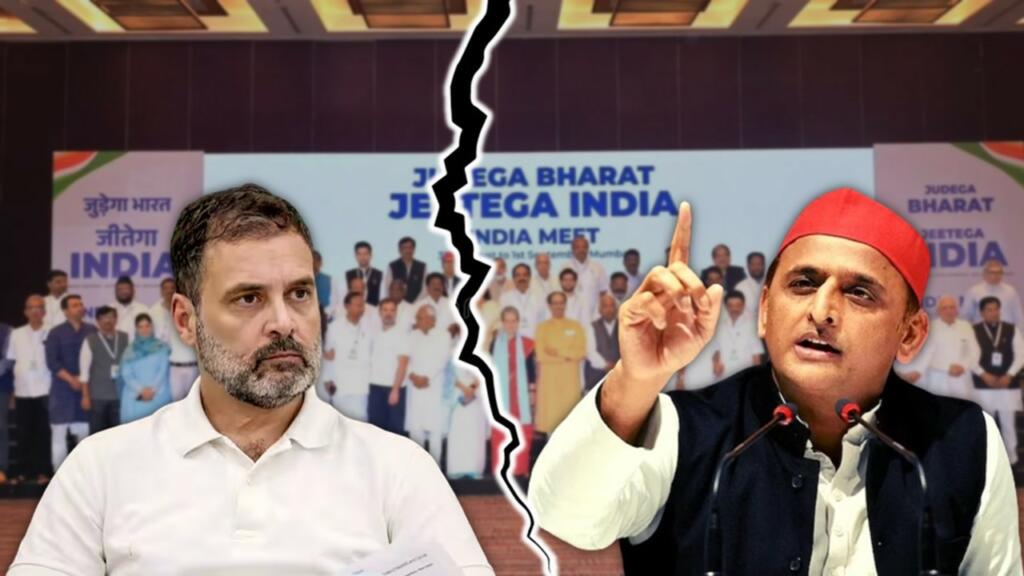Just a month away from the eagerly anticipated provincial elections in five states – Madhya Pradesh, Mizoram, Telangana, Chattisgarh, and Rajasthan – the INDI alliance is teetering on the brink of a slow and painful disintegration. The recent heated argument that transpired within the alliance has prompted the Samajwadi Party to issue an official threat of parting ways, alleging that they were snubbed by the Congress in Madhya Pradesh regarding seat allocation.
In a scathing statement, party supremo Akhilesh Yadav expressed his frustration, claiming that “Congress has cheated us. Despite providing all the details about our performance, the Samajwadi Party has been allocated zero seats. If we had known that the alliance was not meant for state elections, we wouldn’t have even answered their calls.”
For those who might be unfamiliar with the INDI alliance, which stands for India National Development Inclusive Alliance, it comprises an uneasy coalition of parties, including the RJD, Congress, JDU, TMC, and NCP (Sharad faction), among others. Despite its grand name, the alliance has been far from cohesive.
Also read: I.N.D.I.A. alliance serves 2024 to BJP on a golden platter!
Before the provincial elections, the Trinamool Congress (TMC) has made its intentions clear by opting to go solo. On the other hand, the Aam Aadmi Party (AAP) and the Nationalist Congress Party (NCP) don’t appear overly enthusiastic about this alliance, even though they share a common goal of toppling Prime Minister Modi and his NDA alliance in the 2024 general elections.
With Akhilesh Yadav now seething over the seat-sharing equation, the survival of his alliance with the Congress in Uttar Pradesh seems highly uncertain, especially considering their past electoral performances in the state. In both the 2017 and 2022 state elections, the alliance faced defeat.
This disarray within the INDI alliance could have significant repercussions for the upcoming provincial elections and, by extension, the broader political landscape. The alliance was initially formed with the aim of presenting a united front against the ruling parties in these states. However, the recent rifts have raised questions about its efficacy and ability to achieve this goal.
The Samajwadi Party’s grievances stem from its perceived mistreatment in Madhya Pradesh, where the Congress seems to have reserved all the seats for itself. This unilateral decision has left the Samajwadi Party feeling marginalized and disregarded. The alliance’s lack of transparency and a shared vision for the upcoming state elections has further exacerbated the situation.
The situation is further complicated by the TMC’s decision to go solo in these elections. Mamata Banerjee’s party, after its impressive victory in West Bengal, is eager to establish a strong foothold in other states. This move could dilute the alliance’s strength and affect its chances of success in the polls.
Additionally, the AAP and NCP, while sharing a common agenda to challenge Prime Minister Modi in the 2024 general elections, are reluctant to commit to the INDI alliance for the provincial elections. Their hesitation likely stems from the alliance’s internal discord and the uncertainty surrounding its ability to deliver electoral wins.
The fallout within the INDI alliance underscores the broader challenge of forging successful political coalitions in India’s diverse and dynamic political landscape. The country’s political spectrum is replete with regional parties, each with its own agenda, priorities, and power dynamics. Finding common ground and maintaining a cohesive front is often a complex and demanding task.
Also read: Why Nitish Kumar will dump the I.N.D.I.A. alliance
As the provincial elections draw near, the fate of the INDI alliance hangs in the balance. Its inability to address internal rifts and disagreements has cast a shadow over its prospects in these states. The alliance’s troubles also cast doubt on its ability to present a united challenge to the NDA alliance in the 2024 general elections.
In the coming weeks, political observers and voters in Madhya Pradesh, Mizoram, Telangana, Chattisgarh, and Rajasthan will be closely watching how these developments unfold. The outcome of these elections will not only determine the immediate political landscape of these states but also provide valuable insights into the evolving dynamics of Indian politics.
Support TFI:
Support us to strengthen the ‘Right’ ideology of cultural nationalism by purchasing the best quality garments from TFI-STORE.COM.
